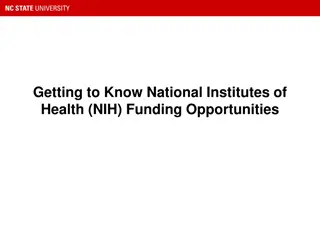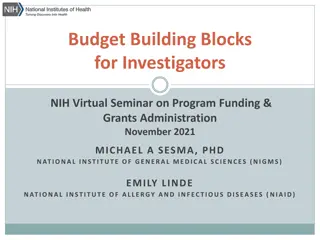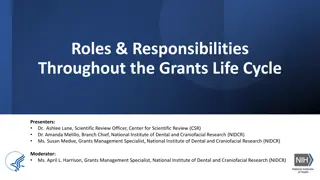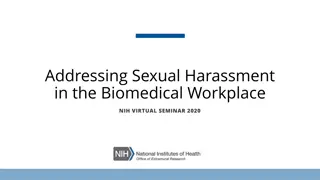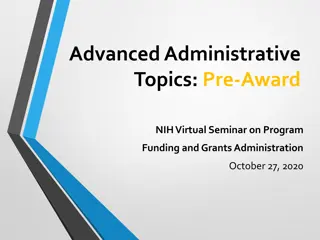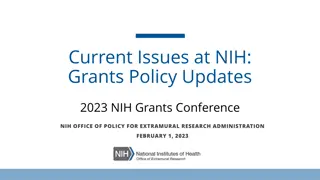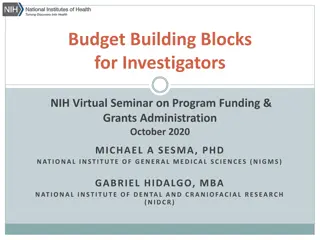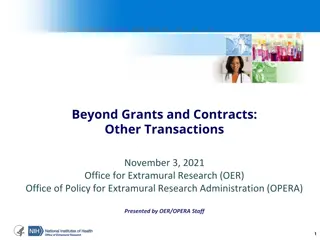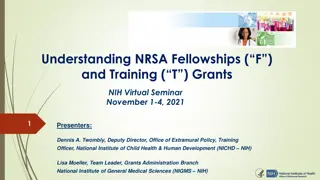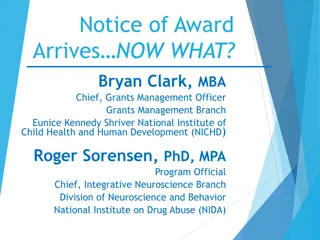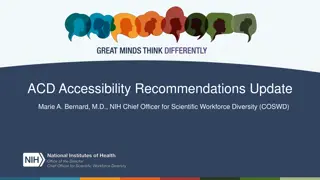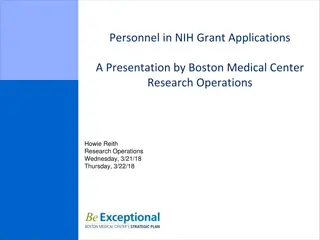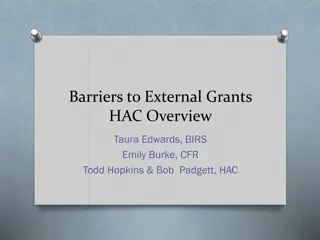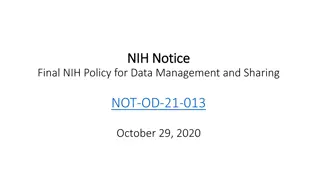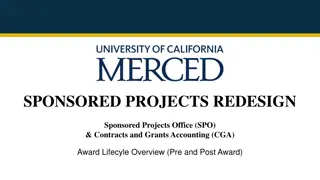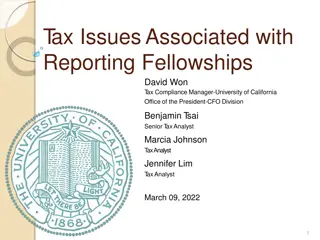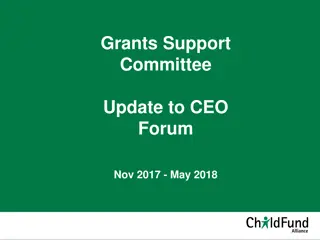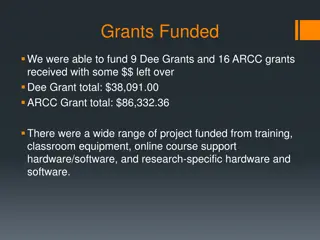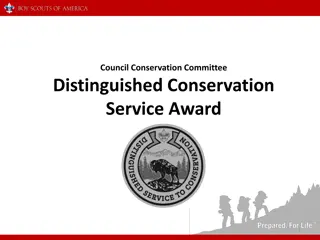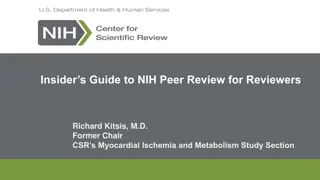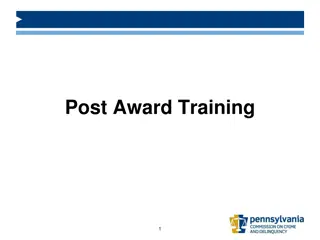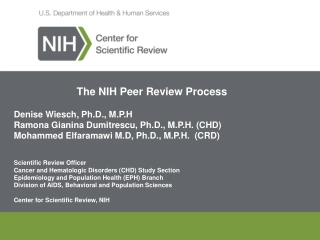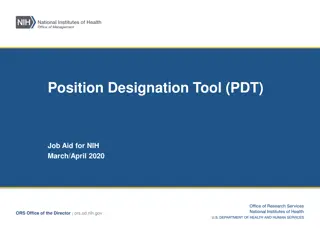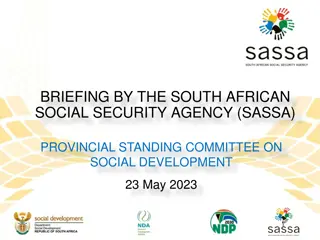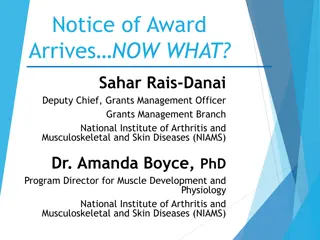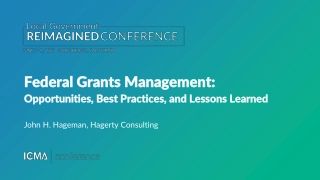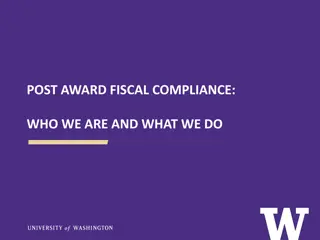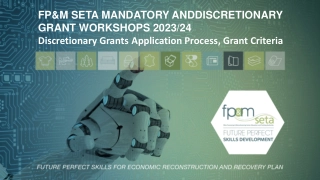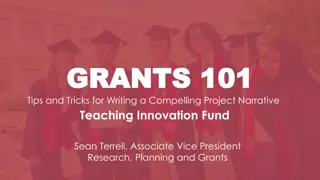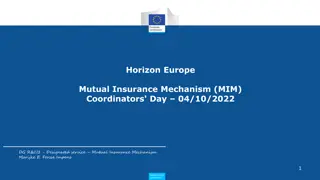Insights into Post-Award Challenges in NIH Grants Administration
Explore the complexities and issues in post-award management of NIH grants through case studies and real-life examples. Key aspects discussed include changes in recipient organizations, research team delays, large balances, and unexpected changes post-award. Gain perspectives on federal policies, taxpayer investments, and considerations for challenging situations in grant administration.
Download Presentation

Please find below an Image/Link to download the presentation.
The content on the website is provided AS IS for your information and personal use only. It may not be sold, licensed, or shared on other websites without obtaining consent from the author. Download presentation by click this link. If you encounter any issues during the download, it is possible that the publisher has removed the file from their server.
E N D
Presentation Transcript
Advanced Administrative Topics: Post-Award NIH Virtual Seminar on Program Funding and Grants Administration October 28, 2020
Presenters Crystal Wolfrey Chief Grants Management Officer National Cancer Institute **************************** Sean Hine Branch Chief National Cancer Institute **************************** Special Guest: Terri Jarosik Chief Grants Management Officer National Institute of Mental Health 2
Quick logistics You are all muted with no video You are welcome to put questions in the Q&A however This session relies heavily on case studies real-life examples of issues that have occurred We will be trying to cover a number of topics directly and indirectly - throughout We will most likely not have ample time to cover Q&A but we have some plans
What Are Some Aspects that Make Projects Complex and Create Post- Award Issues? Post-award change of recipient organization Project team at multiple institutions Delays in the research Significant changes in the research team Significant large balances accruing in the award Unexpected post award changes 4
Thinking Like a Fed a Few Things to Remember Must support federal policy, to enforce applicable laws, cost principles and administrative requirements Must support the President's initiatives and policies. Stewards of federal funds Larger IC s have more funds which can mean more flexibilities The correct answer often really is it depends 5
NIH Perspective When Considering Challenging Complex Situations During Post-Award Have we "listened" enough to really understand all the issues and objectives of the situation? What is in the best interest of the science? What will best serve the investment of the taxpayer in the project? Do we have the necessary funds to support the proposed arrangements? How would this play if presented on the evening news or the front page of ......? 6
Issues and Scenarios for Todays Discussion Change of recipient organization Change of principal investigator or key personnel (including multiple PI) Changes and delays in the research and large balances Unanticipated events (aka stuff happens) Close out 7
Change of Recipient Organization Prior approval is required per NIH GPS 8.1.2.7 The grant is awarded to the grantee institution not to the Principal Investigator (PI). A change of grantee request normally will be permitted only when all of the permanent benefits attributable to the original grant can be transferred, including equipment purchased in whole or in part with grant funds. A change may be made without peer review, provided the PI plans no significant change in research objectives and the facilities and resources at the new organization will allow for successful performance of the project. 8
Purely Hypothetical Situation Mid budget period the PI on an application moves to a new organization and wants to take the grant with him/her. However, there are some complications let s listen into the call between the NIH Grants Management Specialist and the Authorized Official for the grant 9
What did we learn? The grant award must be held by the organization conducting the sustentative work and directing the research There are options that can be considered when a PI leaves for a different organization: Transfer the grant Establish a subcontract to support the PI Re-consider the PI arrangement (perhaps establish a multi-PI)
Change of Key Personnel Prior approval is required, per NIH GPS 8.1.2.6 A change of PI request is required if there is a significant change in the status of PD/PI or key personnel named in the NoA, including but not limited to withdrawal from the project; absence for any continuous period of 3 months or more; reduction of the level of effort devoted to project by 25 percent or more from what was approved in the initial competing year award. 11
Change of Key Personnel with Multiple PIs Prior approval for single to multi or vice versa per NIH GPS 9.5 NIH policy allows for post award PD/PI changes with the prior approval of the Grants Management Officer it is expected such requests will be rare. Must have adequate scientific justification, including any proposed changes in scope or budgetary changes, for the proposed addition/change/removal. A new or revised Leadership Plan is required if the change impacts the number of PIs. For prior approval requests including requests to add/drop a PI, the recipient organization is responsible for securing and retaining the required signatures from all PD/PIs 12
Purely Hypothetical Situation You ve Been Voted Off the Island A multi-PI project has been a productive team for years. One of the PI s moves in the 7th year, and a large subaward is issued to continue the collaboration. In the 8th year, the PI s have a falling out. The Contact PI sends a letter to NIH requesting to change the award to a single PI project. The consortium PI contacts NIH, demanding NIH hold the prime grantee to the terms of the peer reviewed Leadership plan. 13
Lets get ready to rumble!
Removing a PI from a grant What Might Be NIH s Response Enter the Answer in the Chat! (A) Move forward with the change of PI grants are awarded to institutions and NIH s relationship is with the prime awardee (B) Deny the request recipient must make it work with both PIs (C) Terminate the grant there is no hope - if the PIs can t get along, we no longer want to fund the grant (D) None of the above
(A) Move forward with the change of PI Grants are awarded to institutions and NIH s relationship is with the prime recipient however . All of the named PIs on a multi-PI grant have the same status and level of responsibility Change of PI is a prior approval request The Institution must ensure they have the approval of all PIs for prior approval requests We cannot move forward with the request until we ensure the above doesn t seem to be this situation
(B) Deny the request or (C) Terminate the grant Neither of these are likely in the best interest of science or the research NIH is supporting although they may be the last resort but first: NIH would immediately look to the Leadership Plan: Describe governance and organizational structure of leadership team, including communication plans, plans for handling publications and intellectual property, and process for making decisions on scientific direction and Procedures for resolving conflicts
(D) None of the above Most likely the best answer why? NIH funded the project for a reason - and we want it to succeed We would require documentation that the recipient took every step in the conflict resolution plan outlined in the leadership plan Sometimes things can be resolved. If not and the recipient took every action possible we would likely honor the request for the change of PI. Take Away make sure you have a strong leadership plan when planning the project.
Changes, Delays and Balances Biomedical research is does not always proceed as planned Projects are delayed Balances accrue in the project Progress points the research in a different direction Changes in scope require prior approval per NIH GPS 8.2.1.5 19
Purely Hypothetical Situation: How Much Is Too Much? During the first year of the grant, the PI has found other sources of funding for a graduate student requested and funded in this application. This results in savings to this grant which is reported on the RPPR. The PI plans to automatically carryover into the next budget period. Is this a problem? Enter YES or NO in the chat 20
Savings on a grant The RPPR reported good progress including multiple publications The savings resulted in a balance as reported on the RPPR The savings would be considered an administrative supplement to the grant Since the progress was good and the work was completed it appears that the funds were not needed - the NIH awarding IC may reduce the next type 5 award
Purely Hypothetical Situation Something s Broken A piece of instrumentation, essential for the NIH-grant, has blown up. The PI wants to put the costs for the replacement on the NIH grant. ENTER IN THE ANSWER IN THE CHAT! A This is not possible since the purchase of the equipment would require NIH s prior approval. B This can be done as long as the equipment is needed for the grant s research and therefore fits in the scope. C No way! This would probably be greater than 25% rebudgeting which would need NIH s prior approval. D Will simply need to wait until the grant recompetes to ask for the money then good luck with the research! 22
Purely Hypothetical Situation Something s Broken A piece of instrumentation, essential for the NIH-grant, has blown up. The PI wants to put the costs for the replacement on the NIH grant. ENTER IN THE ANSWER IN THE CHAT! A This is not possible since the purchase of the equipment would require NIH s prior approval. B This can be done as long as the equipment is needed for the grant s research and therefore fits in the scope. C No way! This would probably be greater than 25% rebudgeting which would need NIH s prior approval. D Will simply need to wait until the grant recompetes to ask for the money then good luck with the research! 23
Why not Answers A or C? Per the NIH Grants Policy, the acquiring of a piece of equipment and/or the rebudgeting of funds greater than 25% are indicators of a change in scope that may require NIH prior approval. If there is no change in scope, no approval is needed!
Why not Answer D? The equipment is needed for the grant s research to take place. Never feel like you are stuck because of some bad luck - whether it be equipment or a study behind schedule, etc. Reach out to NIH so we can discuss options.
Why Answer B? Equipment is necessary for the project (in scope) Funds are available in the project Recipient can make the change without NIH s prior approval (assuming no change in scope)
Change in Scope Let s Get Into Something Here Let s set the stage
Details abound An NRSA Fellowship Award is finishing the 2nd year and just submitted the annual progress report (RPPR) for a 3rd year of funding. The NIH Program Official has reviewed it and something does not smell right Let s listen in on a call from the NIH Program Official and the Principal Investigator
Ummmthis doesnt sound good You want to hear what the Program Official and Grants Specialist discussed?? You know you want to
Then what happened??? There were exchanges between NIH and the recipient The recipient even requested to change the scope and sponsor after the fact Ultimately, the NIH decided that: The new scope could not be approved The research had to return to the originally planned aims Funds for the past year had to be returned The NIH also obtained a copy of the recipient s RPPR review procedures
Lightning Round Q&A Let s see if we have any questions in the chat For the next 5 minutes, we will address as many questions as we can If they are too involved, we may need to skip it. However, please feel free to contact us via e-mail (or attend one of the many Meet the Expert sessions!)
Unanticipated Events (aka Stuff Happens) Most problems start out small . Only when unaddressed and/or left unchecked can they grow into ugly monsters. 32
Progress Issues Here is the situation 5 Year grant No concerns with years 1 & 2 the accrual portion of the grant is set to begin in year 3 Year 3 s progress report arrives the Program Official notes that thus far, only 10 of the planned 100 patients have been accrued and a significant balance is reported Accrual was supposed to be completed by the end of year 4, but the RPPR indicates that the timeline is now showing completion of the accrual in year 5.
Progress Issues? What can be done? First, get in touch with NIH the sooner the better! There are options that can be considered: Extensions during the project period Interim reporting/milestones Restructuring the budgets (accounting for the new timeline) Worst case phasing out the grant Future year funds in a grant are not guaranteed! However, NIH is here to help in any way we can.
Communication Between Department and Sponsored Projects is Critical Many solutions are organizationally culture- driven. For example, if good communication is part of the culture, then it is more likely to support good management practices, such as work groups across departmental boundaries. Current, written, and accessible policies and procedures are a must. All parties involved must know and understand and comply with the rules, policies guidelines. If not, well outcomes are not likely to be positive. 36
Resources I. Your Organization Sponsored Programs Office Accounting Office Internal Auditor IRBs IACUCs II. NIH Grants Management Specialist Program Administrator Office of Laboratory Animal Welfare (OLAW) http://grants.nih.gov/grants/olaw/olaw.htm Office of Financial Management http://ofm.od.nih.gov Grants Policy & Guidance http://grants.nih.gov/grants/policy/policy.htm III. DHHS Office for Human Research Protections (OHRP) 37
Resources for Compliance Tips, methods, what to do? So many resources, only a select few are named here. NIH Grants Compliance and Oversight website has compendium of observations, and presentations http://grants.nih.gov/grants/compliance/compliance.htm NIH Grants Compliance Inbox grantscompliance@mail.nih.gov NIH Outreach Activities http://grants.nih.gov/grants/outreach.htm 38
Select Resources at the NIH Grants Management Specialist on the Notice of Award - If unknown, contact Chief GMO of IC: http://grants.nih.gov/grants/stafflist_gmos.htm Program Official on the Notice of Award Office of Extramural Research: http://grants.nih.gov/grants/oer.htm NIH Grants Information: http://grants.nih.gov/grants/giwelcome.htm NIH Grants Policy Inbox (policy questions not specific to the NoA): grantspolicy@mail.nih.gov Division of Financial Advisory Services: http://oamp.od.nih.gov/dfas 39
Questions?? Feel free to contact us via e-mail: Crystal Wolfrey - crystal.wolfrey@nih.gov Sean Hine sean.hine@nih.gov Terri terri.jarosik@nih.gov 40
We have a few minutes Bring on the questions!! Enter your questions in the Q&A and we will address what we can!


